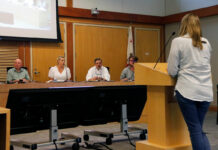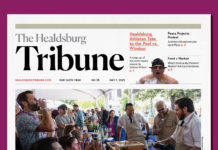Ending the Healdsburg Growth Management Ordinance (GMO) has been promoted with the argument that reduction of regulatory limitations on building market-rate housing will increase the number of affordable housing units available.
There are only three ways that new affordable units can be built.
First, conceivably, affordable market-rate units might somehow be built. GMO opponents do not usually make this claim directly, but it is an implied possibility and should be addressed explicitly.
At the Healdsburg Community Housing Committee’s forum for developers, the panelists demolished this hope. Their unanimous and very strong conclusion was that essentially no market-rate housing will be built that will be faintly close to affordable. Even if most of the building consists of apartments, and even if the building is dense, the result will be dense, expensive, market rate apartments. If building regulations are loosened, the units might be slightly cheaper, but still not affordable. That’s what all the developers said.
The second way is through city subsidies, not dependent on builders. The city does build housing by this route. At least half a dozen ways have been suggested by which the city could tap new funding to increase this kind of building.
Distracted by the siren song of gutting the GMO, the city has not looked into most of these. In any event, this approach does not depend on reducing restrictions on market rate building, so it doesn’t in any way support opposition to the GMO.
The third way, and now the only way, which does depend on building market rate housing, is through the inclusionary housing requirement that for a given number of new non-rental units, a percentage of low-income units be built.
However, the Keyser Marston study done for San Francisco showed that in that city, the building of market rate housing will increase the need for affordable housing by between 20 and 43 percent of the total units built. The reason this is true there, and must be true generally, is that new residents of market rate housing will be relatively well off, and will not do all their own gardening, house cleaning, home maintenance, child care, etc.
They will go out to eat, and into the local shops, where 80 percent of the workers who serve them, by the city’s figures, earn only about half the area median wage, or less. So the city will need additional low-income workers.
Healdsburg proposes increasing the inclusionary percentage, but all the increase is going to a relatively few with much higher incomes. We will continue to have only 15 percent going to the much larger number of low-wage workers who are experiencing a serious crisis.
Since the only way that loosening restrictions on market rate building will add any significant amount of affordable housing will be through inclusionary housing, and since it should be clear that 15 percent inclusionary affordable housing will not keep up with the new need market rate building will engender, I request that advocates of abolishing the GMO stop implying this is a way, let alone the best way, to deal with the current affordable housing crisis.
Actually, it gets worse. The city needs hundreds of additional affordable housing units. If the GMO is removed, the city will allow up to 420 market-rate units to be built in the next six years. Add in the 70 market rate units earlier allocated to Saggio Hills, and we get 490. However, by the city’s estimate, the maximum number of units that could be constructed on all the city’s buildable lots is somewhere between 340 and 656 new units.
If the high estimate is correct, we may have used up most of the buildable lots at the end of six years. If the low estimate is correct, all the lots may be used up in under four years. In either case, there will be no space left for building the affordable units we need. Keeping the GMO does not necessarily mean that the city will do the things necessary to create enough affordable housing (or retain what already exists). But removing the GMO does nothing to help, and may forestall that creation. Accordingly, I encourage you to vote no on Measure R.
— Robert Neuse is a Healdsburg resident








